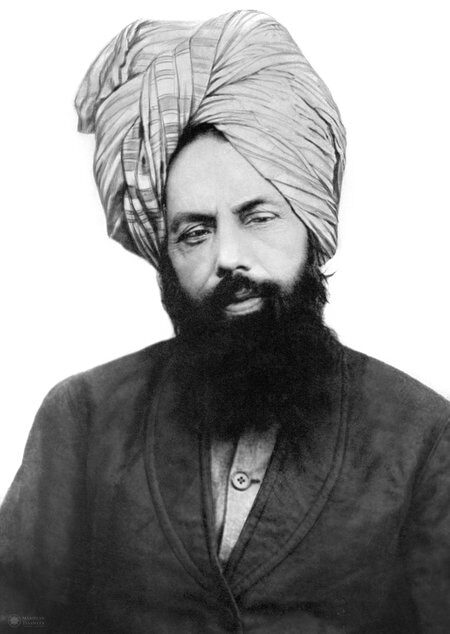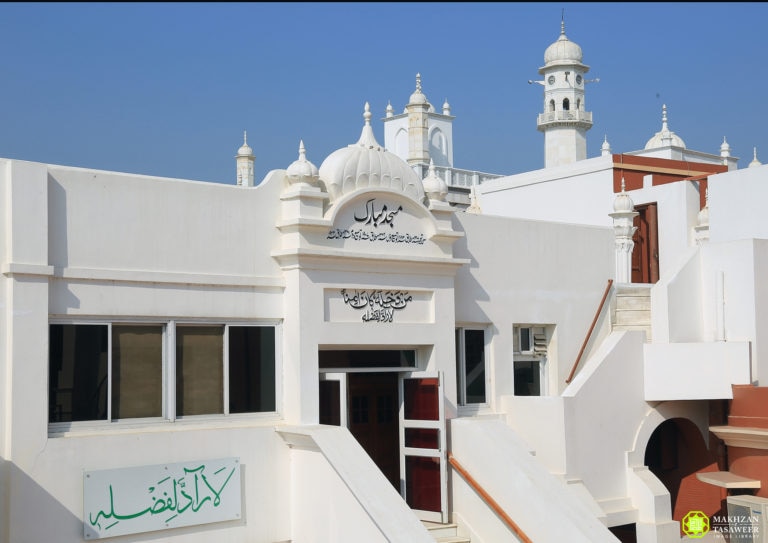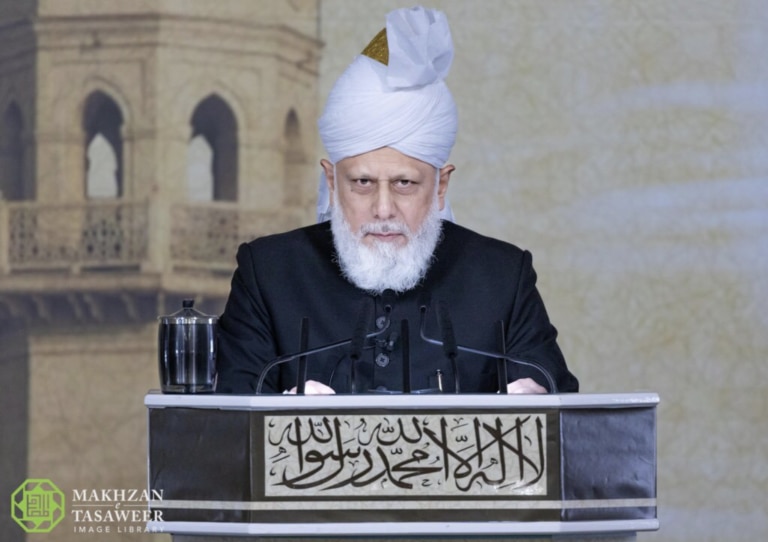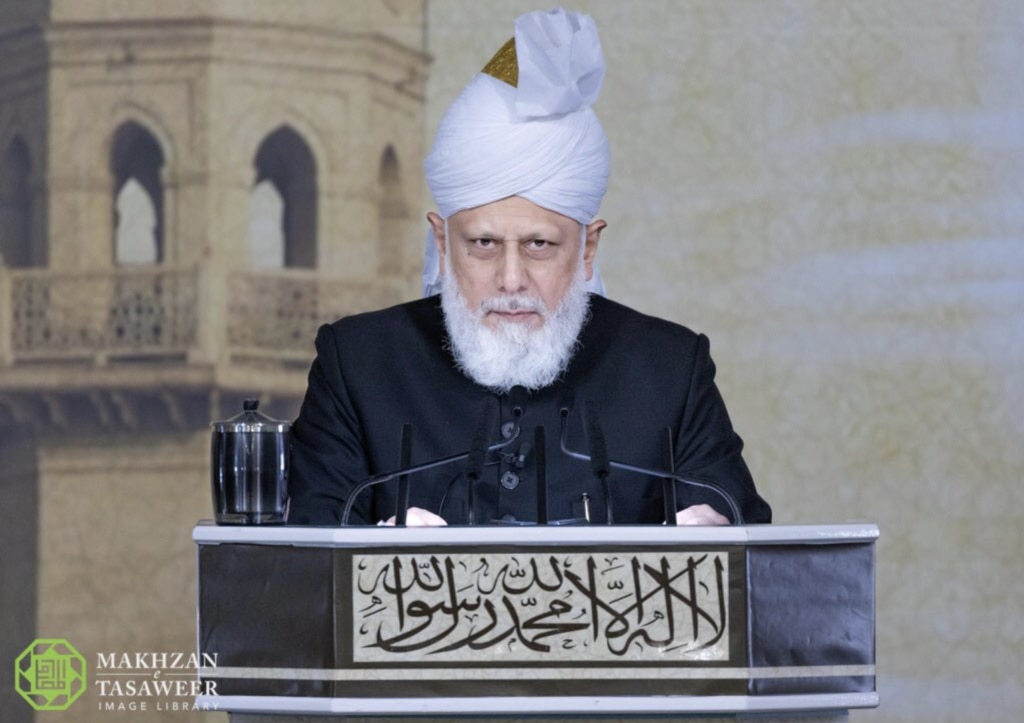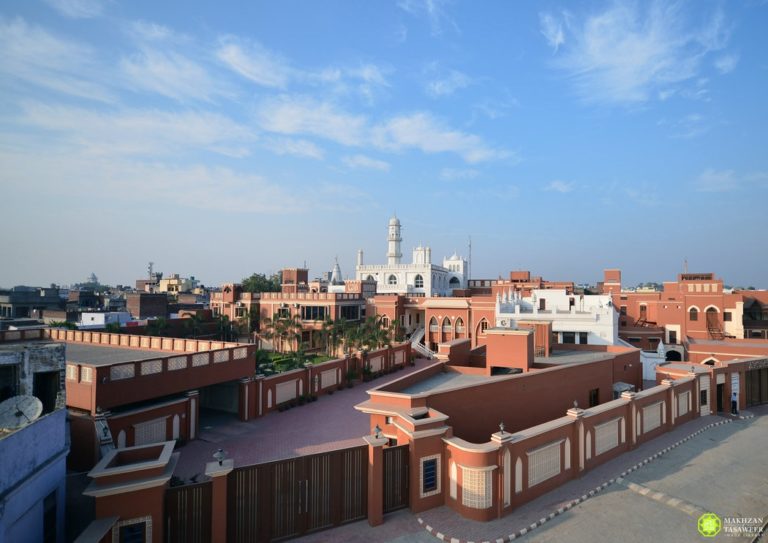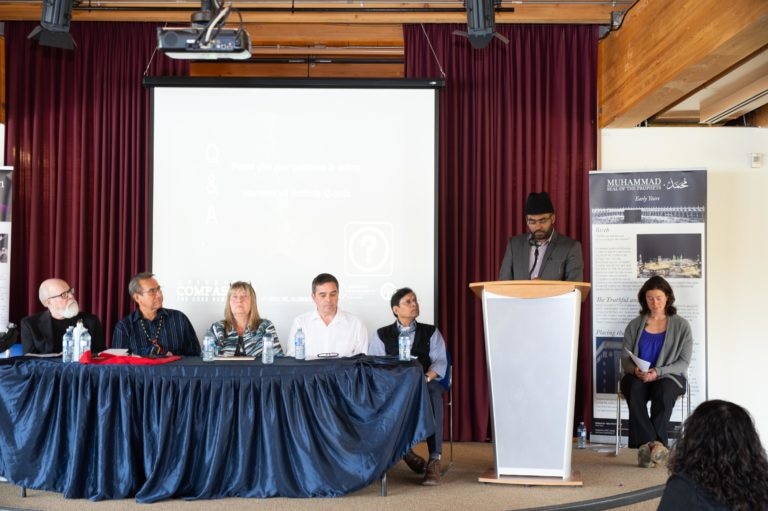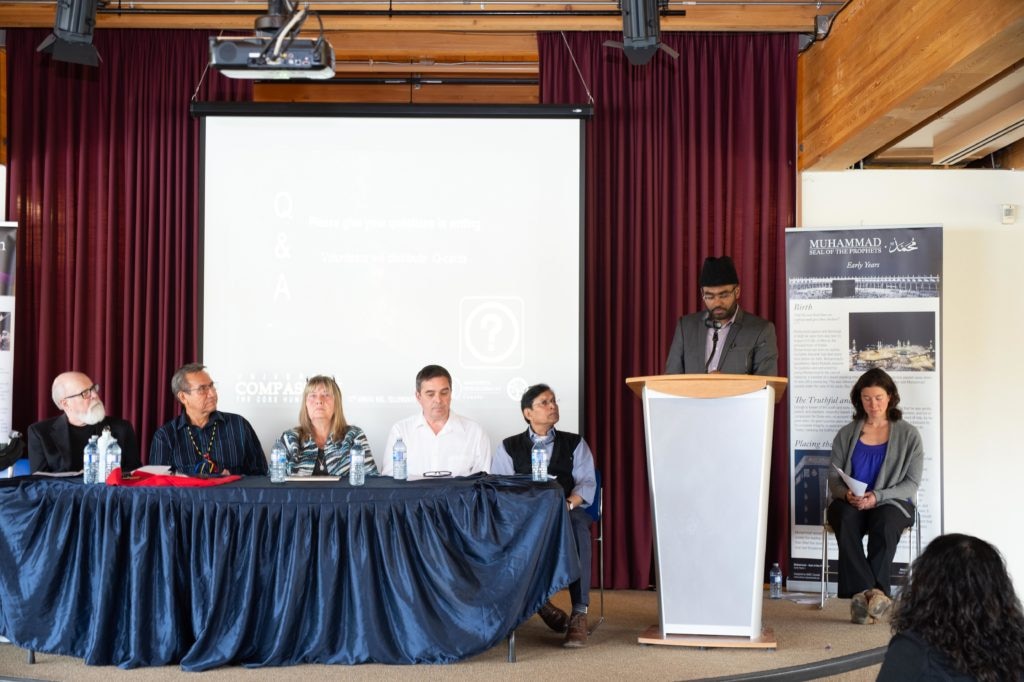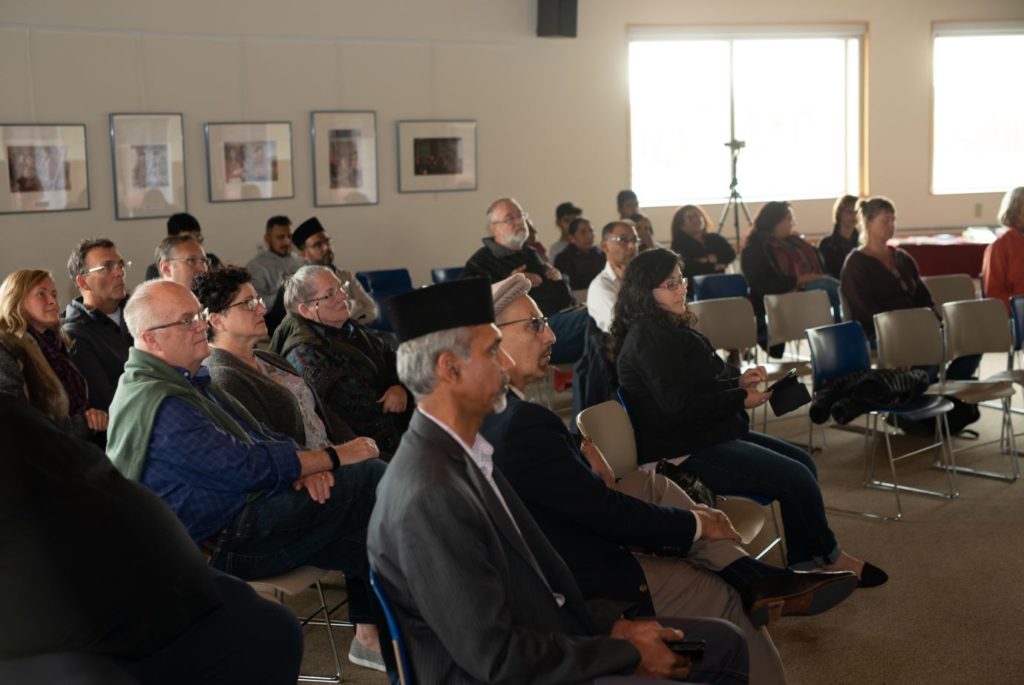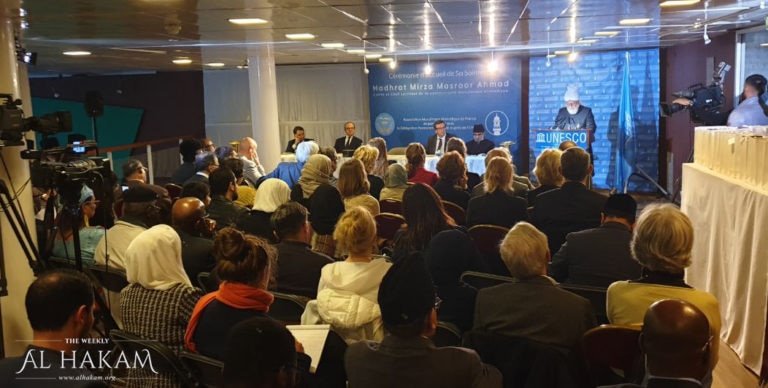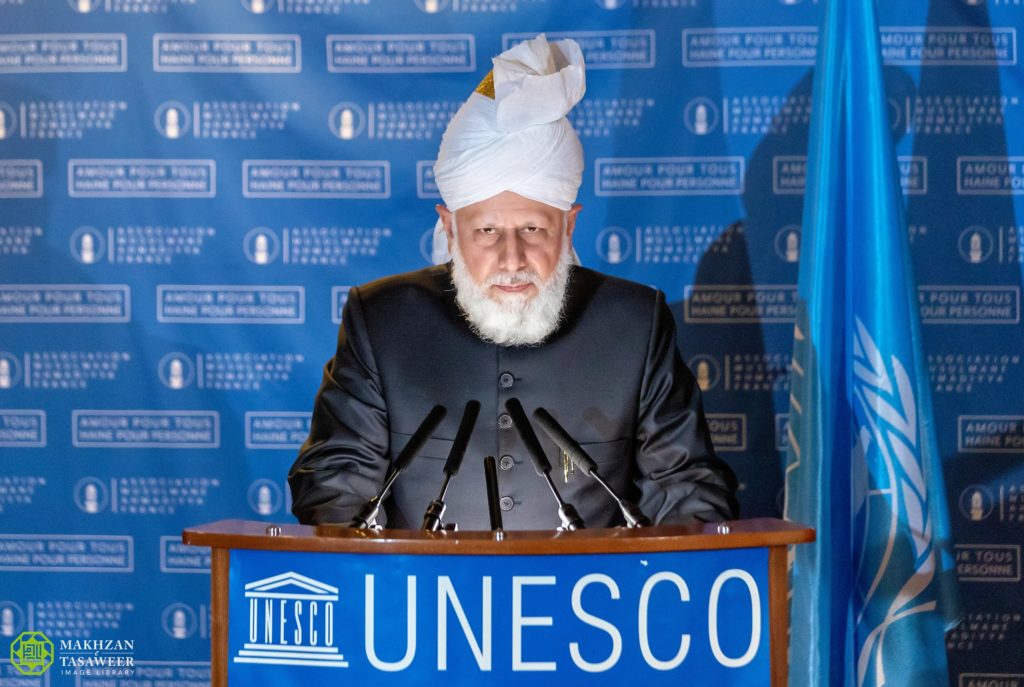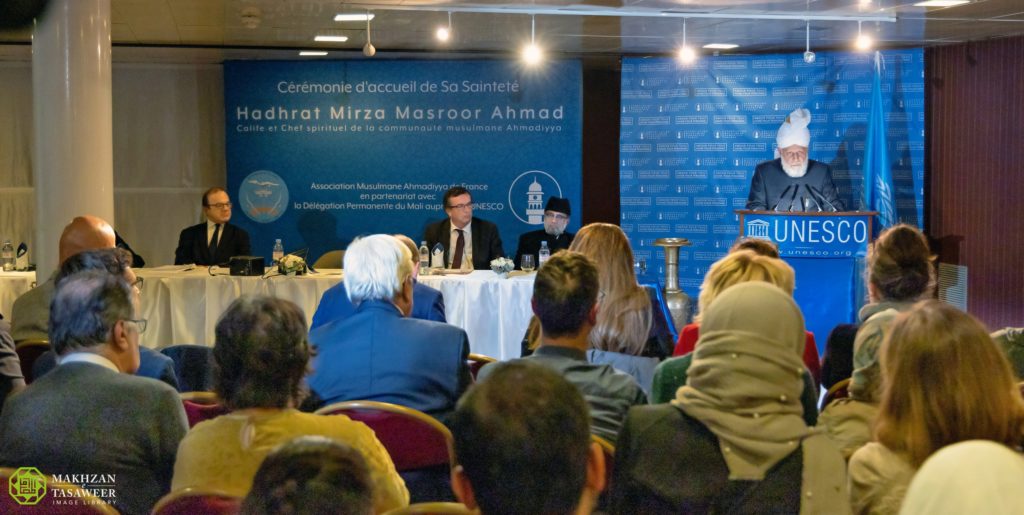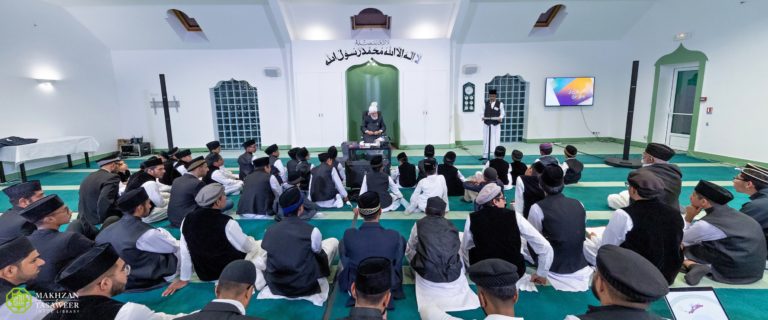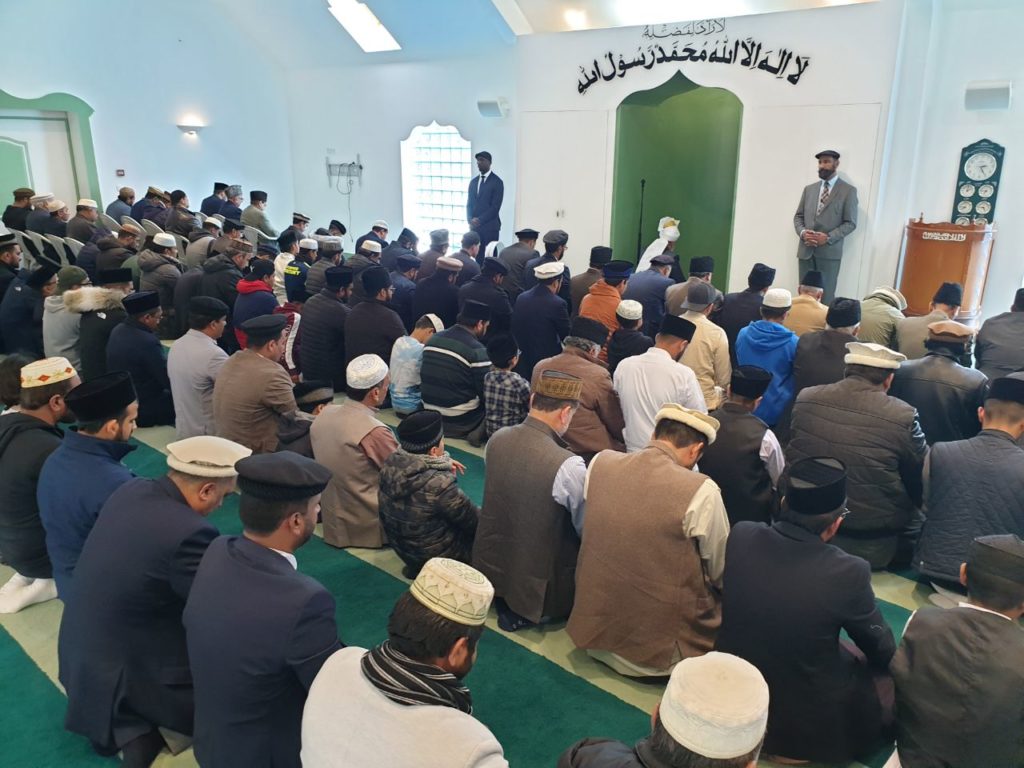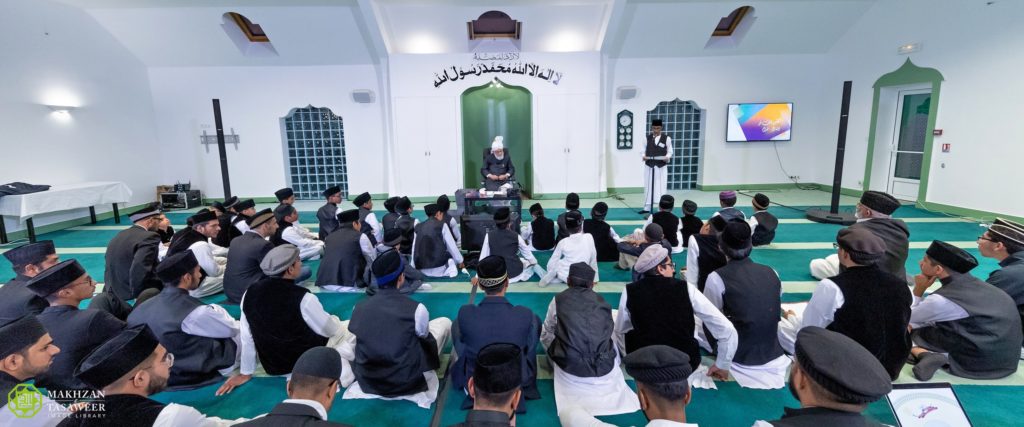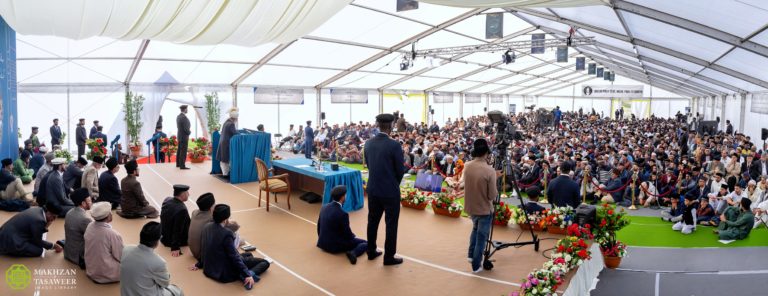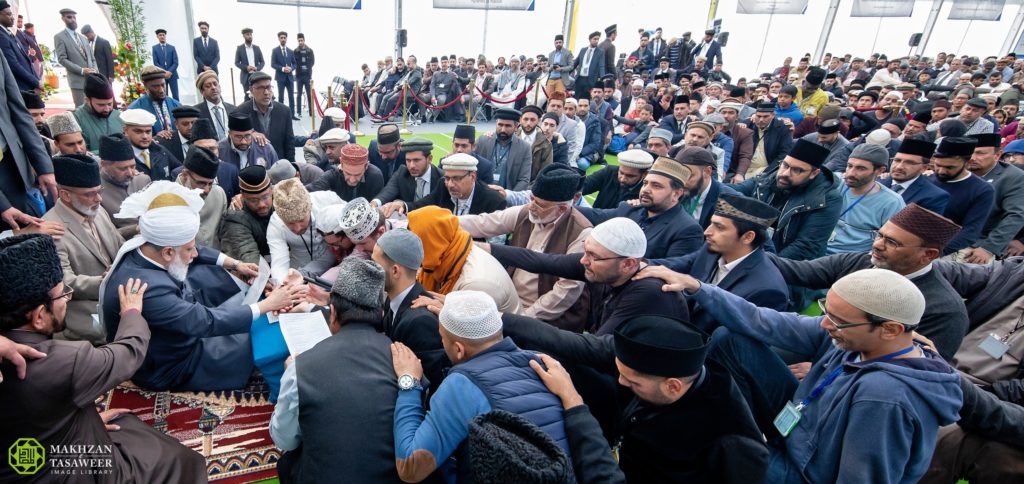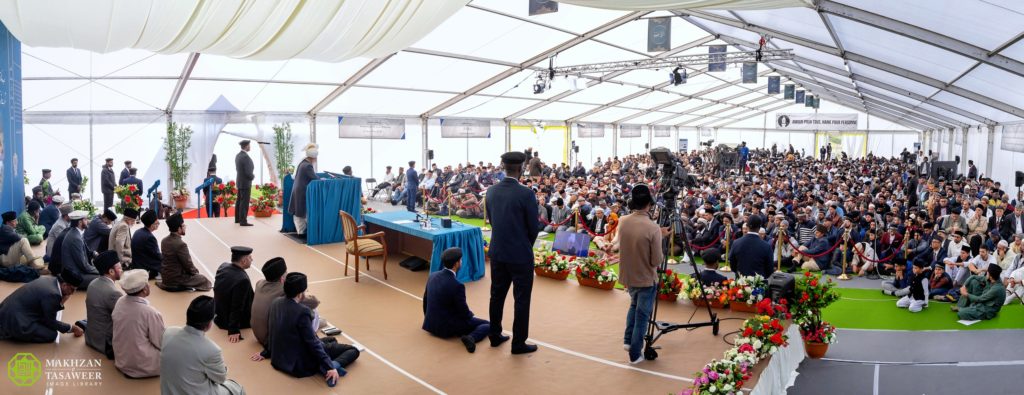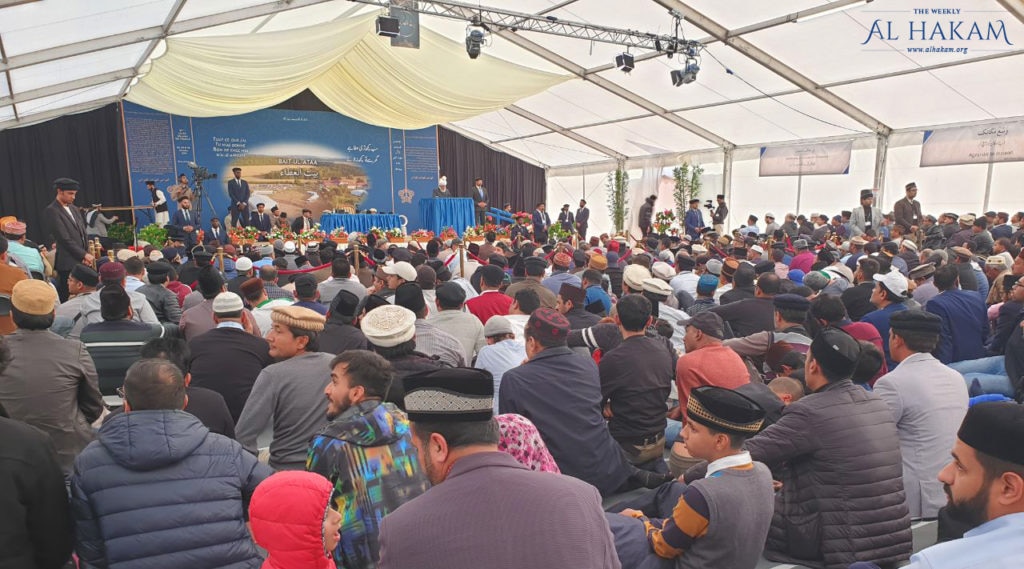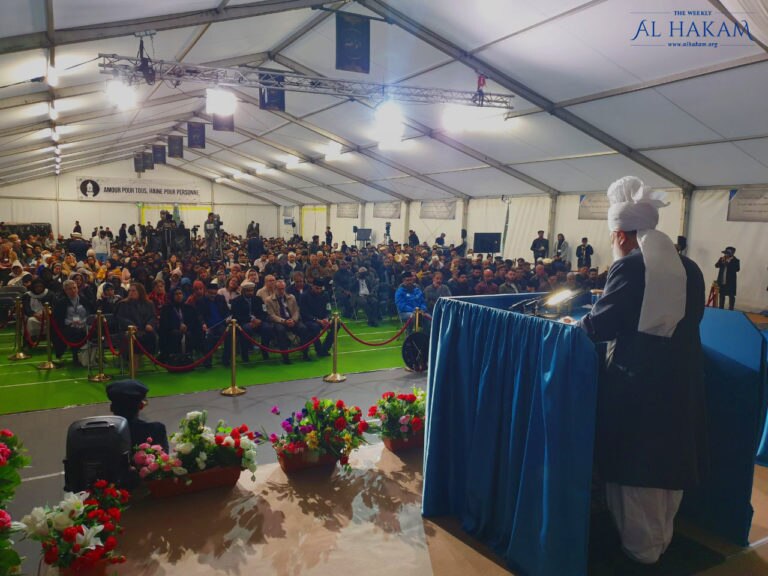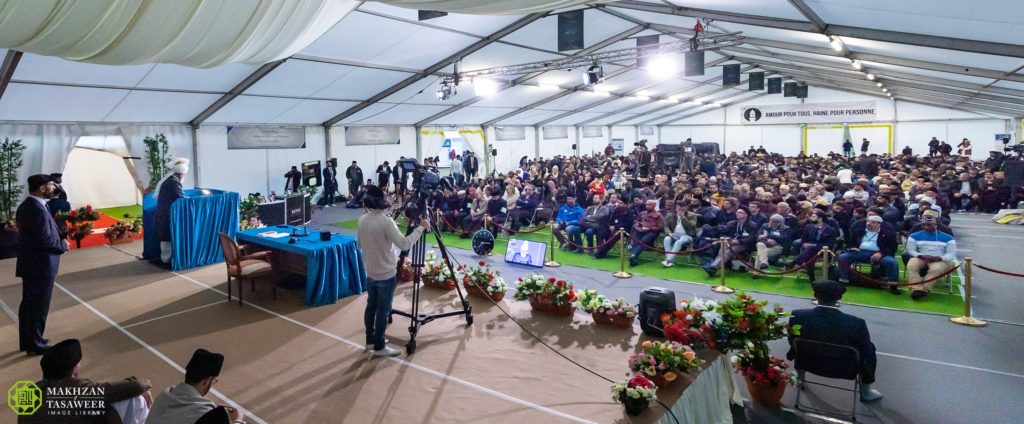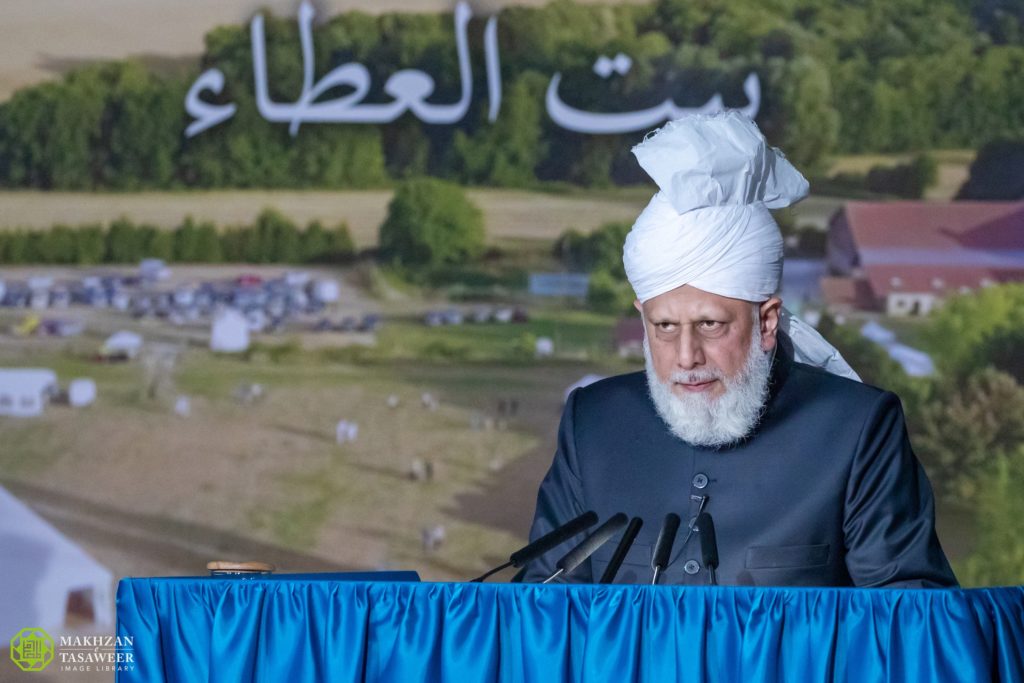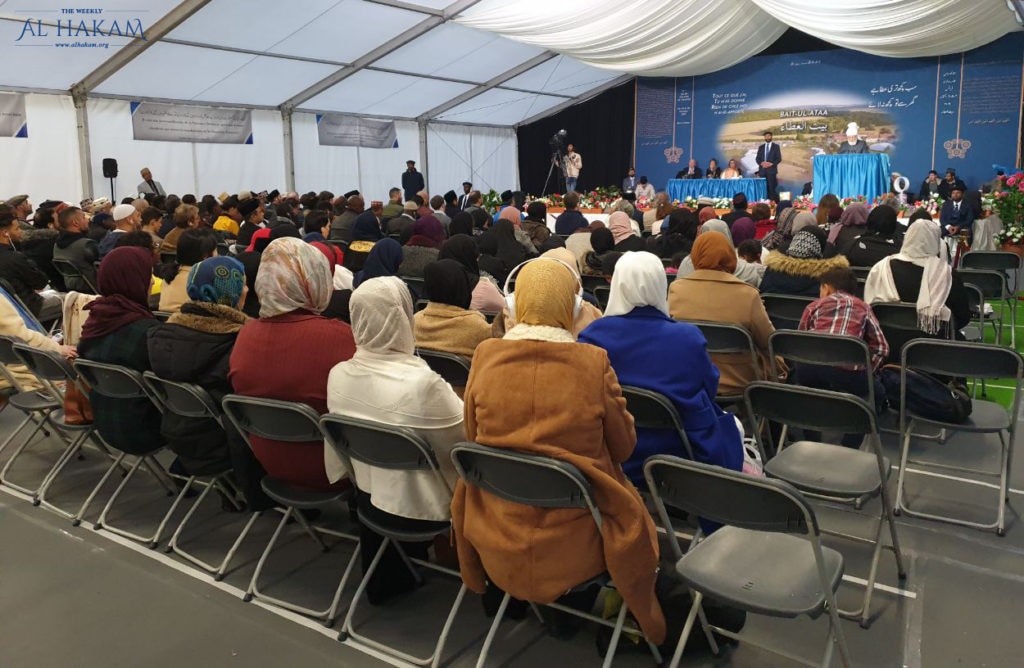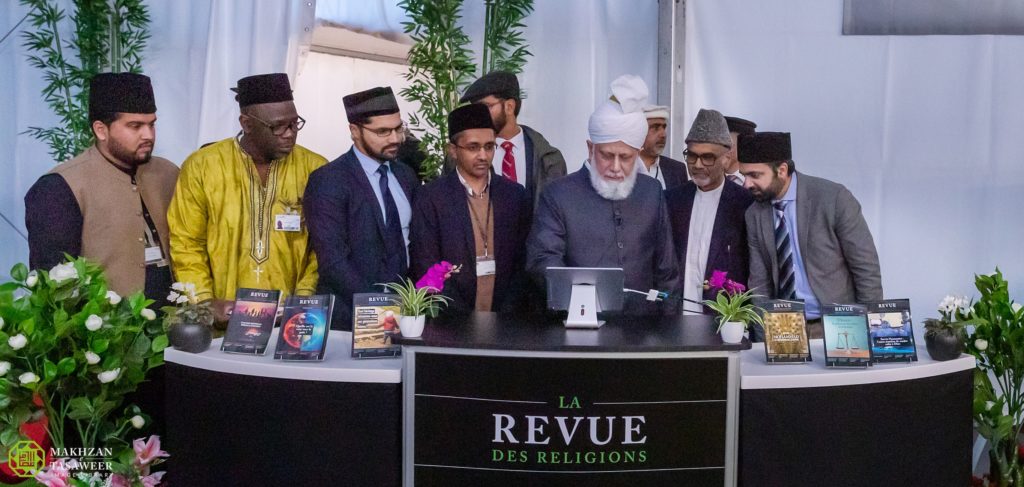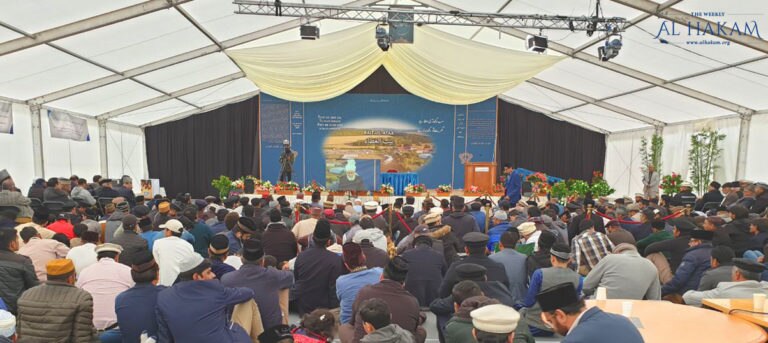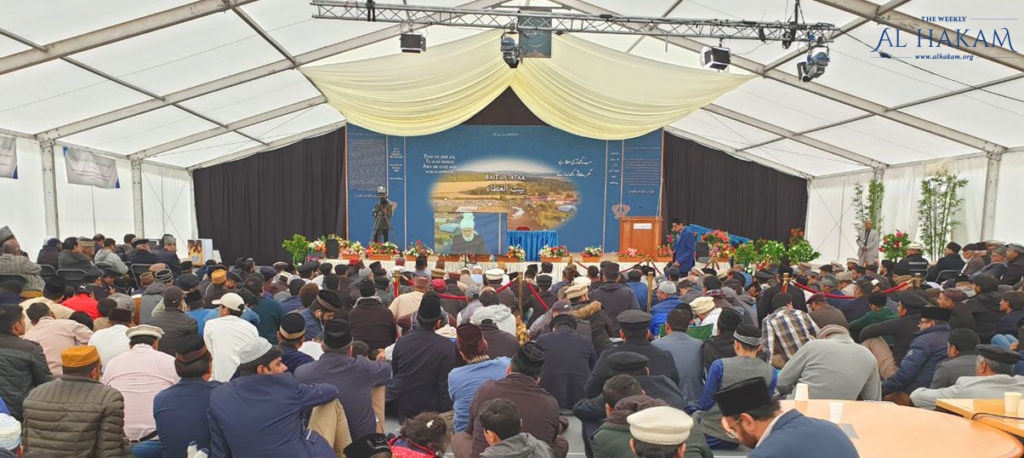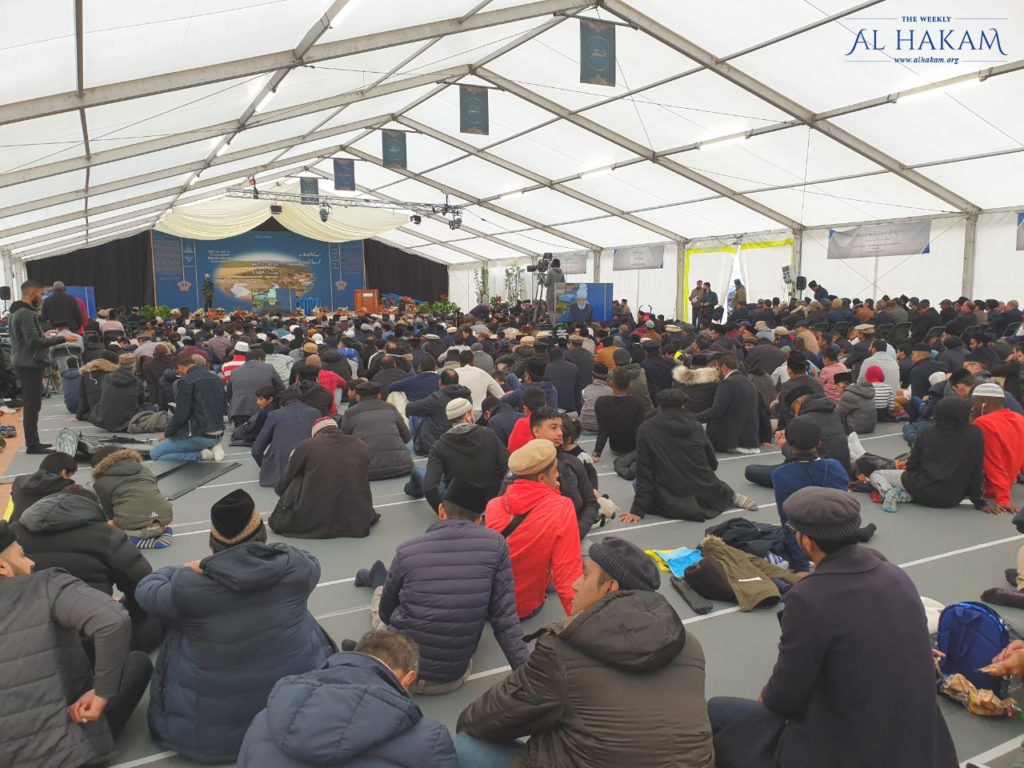Friday Sermon
6 September 2019
Men of Excellence
After reciting the Tashahud, Ta‘awuz, and Surah al-Fatihah, Hazrat Khalifatul Masih Vaa stated:
The
series of narrating the accounts of the lives of the Badri companions, which I
have started, will continue today. However, before I do so, I would like to say
to Ansarullahon the occasion of their Ijtema that when those
companions, among whom were Ansar as well as Muhajir, accepted Islam, they
inculcated pious transformations within them and they set wondrous examples of
sacrifices, righteousness, sincerity and loyalty.
Most of you who are present here at this
moment in time, have reached the age of Ansarullah and are Ansar as well as
Muhajir. Hence, you should undertake a constant self-analysis as to what extent
you are following and acting upon those examples that were set before
you.
After these brief words, I will now begin
with the actual subject [of today].
The first account that will be given is of
Hazrat Numanra bin Amr. Hazrat Numan’sra name is recorded
as Numan as well as Nuaiman. His father’s name was Amr bin Rifa‘ah and his
mother’s name was Fatima bint Amr. Among the children of Hazrat Nuaimanra,
we find the following names: Muhammad, Amir, Sabrah, Lubabah, Kabshah, Maryam,
Ummi Habeeb, Amatullah and Hakimah. According to Ibn Ishaq, Hazrat Nuaimanra
participated in the second Bai‘atat Aqabah along with 70 Ansar. Hazrat
Nuaimanra participated in all of the battles alongside the Holy
Prophetsa, including the Battles of Badr, Uhud and Khandaq.
According to a narration, the Messengersa of Allah said, “Say
anything but good about Nuaimanra for he loves Allah and His
Messengersa.” Hazrat Nuaimanra passed away in 60 AH
during the rule of Hazrat Amir Muawiyahra. (Al-Tabaqaat-ul-Kubra
li ibn Saad, Vol. 3, p. 257 Dar-ul-Haya Al-Turath Al-Arabiy, Beirut,
Lebanon, 1996) (Al-Kamil Fi Al-Tarikh, Vol. 3, p. 405, Dar-ul-Kutub
Al-Ilmiyyah, Beirut, Lebanon 2006).
“Hazrat Ummi Salamara narrates
that Hazrat Abu Bakrra went to Busra a year before the demise of the
Holy Prophetsa.” (Busra is a historical and famous city of
Syria. During a trade journey to Syria, the Holy Prophetsa along
with his uncle, stayed in this city. Likewise, when the Holy Prophetsa
took the trade goods of Hazrat Khadijara to Syria, he also stayed at
this place. Maisarah, the servant of Hazrat Khadijara also
accompanied the Holy Prophetsa on that journey.)
In any case, [she narrates that] Hazrat Abu Bakrra undertook a trade journey to that place before the demise [of the Holy Prophetsa], and was also accompanied by Nuaimanra
and Suwaibitra bin Harmalah. Both of these men participated in the
Battle of Badr. In this journey with Hazrat Abu Bakrra, Nuaimanra
was entrusted with the provisions. It was during this journey that in a
lighthearted moment, Hazrat Nuaiman’sra companion sold him off to a
tribe.
I have mentioned this incident once before
whilst narrating the account of the life of Hazrat Suwaibitra.
However, I will briefly narrate it again.
Suwaibitra, who was his
companion, had a light-hearted nature. We find in the narrations that both
Hazrat Numanra as well as Hazrat Suwaibitra had a very
frank and informal relationship and would often have a lighthearted
conversation with one another. During the journey, Hazrat Suwaibitra
asked Numanra to give him some food. However, he replied, “As long
as Abu Bakrra does not return (as he had gone somewhere), I will not
give you any food.” Upon this, Saiwaibitra replied, “If you do not
give me anything to eat then what I will say may infuriate you.” The narrator
of this tradition states that in the meantime, they passed by a tribe. Upon
this, Suwaibit asked them if they would purchase a slave from him. (Either this
particular incident took place a few days later or perhaps occurred at that
time, as they were walking along on their journey. In any case, it was soon
after their initial conversation.) Hazrat Suwaibitra asked the tribe
if they would purchase a slave from him. The tribe replied that they would do
so. Upon this, Suwaibitra informed them, “He talks a lot and he will
continuously repeat that he is a free man. Thus, when he says this to you and
asks you to release him, do not do so lest you ruin my slave.” They replied,
“We will not do so and we wish to purchase him from you.” Hence, they bought him
in exchange for ten camels. Following this, these people came to Nuaimanra
and wrapped [the cloth of] a turban or a rope around his neck in order to take
him as a slave. Nuaimanra said to them that he was in fact joking
with them and protested that he was a free man not a slave. However, they
replied that they had already been informed about him. Nevertheless, they
forcefully took him with them. When Hazrat Abu Bakrra arrived and
people informed him about this, he went after the people of this tribe, returned
their camels and brought Nuaimanra back. The narrator of this
tradition further states that when these individuals returned to the Holy
Prophetsa and informed him about this, the Holy Prophetsa
and his companions enjoyed listening to this and continued to enjoy this
lighthearted moment among them for almost a year. (Sunan Ibn Majah,
Kitab-ul-Adab, Baab-ul-Mazaah, Hadith no. 3719) (Mujam-ul-Buldan, Vol.
2, p. 348) (Farhang-e-Sirat, p.58, Busra)
In certain other books, this incident is
described as Hazrat Numanra who was the one who sold Hazrat Suwaibitra
and not the other way around. (Usdul
Ghaba Fi Marifat Al-Sahaba, Vol. 2, p. 354, Suwaibitra
bin Harmalah, Dar-ul-Fikr, Beirut, 2003)
Nevertheless, this narration is found in
reference to both of them. In relation to Hazrat Nuaimanra, it is
stated that he also had a very lighthearted nature and the Holy Prophetra
would greatly enjoy listening to him.
Rabiah bin Uthman narrates that a Bedouin
once came to the Holy Prophetsa and having entered the mosque, he
sat his camel in the courtyard. Upon this, some companions said to Hazrat Numanra
that if he slaughtered this camel, they would eat its meat as they really
desired to have some meat. They also said that since this was the camel of the
Bedouin and he would subsequently complain to the Holy Prophetsa,
but once the complaint would be made to the Holy Prophetsa, he would
compensate for it. The narrator of this traditions states that having been
persuaded by them, Hazrat Numanra slaughtered the camel. When the
Bedouin came outside and saw his camel in this state, he raised a hue and cry
saying, “O Muhammadsa! My camel has been slaughtered.” The Holy
Prophetsa came outside and enquired as to who was responsible. The
people replied that it was Numanra. Upon this, the Holy Prophetsa
went to look for him. Having committed this act, Numanra had left
the place and was hiding somewhere. Nevertheless, the Holy Prophetsa
went to look for him and found him hiding at Hazrat Zuba’ahra bint
Zubair bin Abd-il-Muttalib’s house. A person at the place he was hiding,
indicated towards his direction with his finger and loudly proclaimed, “O
Prophetsa of Allah! I cannot see him anywhere.” The Holy Prophetsa
took him out from there and asked why he did this. Upon this, Numanra
replied, “O Prophetsa of Allah! The people who told you that I
slaughtered it, they were the ones who in fact encouraged me and told me to do
so. They also said that the Holy Prophetsa would compensate for it
and pay for it later.” Having heard this, the Holy Prophetra touched
Numan’s face with his hand and began to smile. The Holy Prophetsa
then paid the Bedouin the value of the camel. (Usdul
Ghaba Fi Marifat Al-Sahaba, Vol. 4, p. 332, Suwaibitra
bin Harmalah, Dar-ul-Kutub al-Ilmiyyah, Beirut, 2008)
(Al-Fukaha Wa Al-Mazaah, Zubair bin Bukkar, pp. 24-25, 2017)
In his book, Kitabul Fukaaha wa
Al-Mazaah, Zubair bin Bukkar relates an incident regarding Hazrat Numanra.
He writes that whenever a travelling salesman or merchant would enter Medina,
Hazrat Numanra would always purchase something from them and present
the items to the Holy Prophetsa as a gift from himself. Since he was
familiar to them, therefore he would tell them where he lived and they would
retrieve the cost later. Therefore, when the owner would come to Hazrat Numanra
to retrieve the cost, Hazrat Numanra would bring him to the Holy
Prophetra and ask him to pay for the item he gave him. (He would
request the Holy Prophetsa to pay for the item that he had purchased
and brought for him.) The Holy Prophetsa would reply, “Did you not
gift this to me?” to which Hazrat Numanra would answer, “O Messengersa
of Allah! By God, I did not have anything to pay for them at the time, but it
was my desire for you to eat of it if it was something edible, and that you
keep it if it was something to keep.” The Holy Prophetsa would smile
and would instruct for the merchant to be paid for his item. (Al-Fukaha
Wa Al-Mazaah, Zubair bin Bukkar, p. 27, 2017)
Thus, these are example of the gatherings
which were filled with such extraordinary love, affection and
light-heartedness; and it was not the case that they were always strictly
formal and without any lighthearted moments.
The next companion I shall mention is
Hazrat Khubaibra bin Isaaf.
Hazrat Khubaibra belonged to the Banu Jusham branch of the
Khazraj tribe of the Ansar. According to another narration, his name was Habib
bin Yasaaf. His father’s name was Isaaf, but according to another narration it
is recorded as Yasaaf. His grandfather’s name is recorded as Itabah, but also
as Inabah. (Al-Sirat al-Nabawiyyah li Ibn Hisham, p. 476, Al-Ansar wa
man ma’ahum, Dar-ul-Kutub al-Ilmiyyah, Beirut, 2001) (Al-Tabaqaat-ul-Kubra
li ibn Sa‘d, Vol. 3, p. 275, Khubaibra bin Yasaaf,
Dar-e-Ihyaa Al-Turath Al-Arabiy, Beirut, Lebanon, 1996) (Usdul Ghaba,
Vol. 1, p. 683, Khubaibra bin Yasaaf, Dar-ul-Kutub al-Ilmiyyah,
Beirut, 2003)
Hazrat Khubaib’sra mother’s
name was Salama bint Masud. Among his children was Abu Kathir, whose actual
name was Abdullah and was born to Jamila bint Abdillah bin Ubayy bin Sulool.
His second son was Abdur Rahman, who was born to Umm-e-Walad. He had a daughter
named Unaisah, who was born to Zainab bint Qais. After the demise of Hazrat Abu
Bakrra, Hazrat Khubaibra married Habiba bint Kharijah,
the widow of Hazrat Abu Bakrra. (Al-Tabaqaat-ul-Kubra, Vol.
3, pp. 275-276, Khubaibra bin Yasaaf, Dar-ul-Kutub al-Ilmiyyah,
Beirut, 1996) (Usdul Ghaba, Vol. 3, p. 153, Khubaibra bin
Yasaaf, Dar-ul-Kutub al-Ilmiyyah, Beirut, 2008)
Even though Hazrat Khubaibra
had not yet accepted Islam at the time of the migration, he had the honour of
hosting and accommodating the Muhajireenin Medina as the migration took
place. Despite the fact that he was not a Muslim, he acted with great
hospitality [towards the Muhajireen]. Hazrat Talhara bin Abdillah
and Hazrat Suhaibra bin Sinaan stayed at his house, but according to
another narration Hazrat Talhara stayed at the house of Hazrat Asadra
bin Zurarah. (Al-Sirat al-Nabawiyyah li Ibn Hisham, p. 338, Dar-ul-Kutub
al-Ilmiyyah, Beirut, 2001)
Likewise, according to a narration, when
Hazrat Abu Bakrra migrated to Medina, he stayed at the house of
Hazrat Khubaibra in Sunah, Qubaa. Sunah is the name of a high area
of the village in the outskirts of Medina where the Bani Harith branch of the
Khazraj tribe lived. Yet according to a different narration, Hazrat Abu Bakrra
stayed at the house of Hazrat Kharijahra bin Zaid. (Al-Sirat
al-Nabawiyyah li Ibn Hisham, p. 348, Khubaibra
bin Yasaaf, Dar-ul-Kutub al-Ilmiyyah, Beirut, 2001)
(Lughaat-ul-Hadith, Vol. 2, p. 373)
Hazrat Khubaibra took part in
all the battles alongside the Holy Prophetsa, including the battles
of Badr, Uhud and Khandaq. (Al-Tabaqaat-ul-Kubra li ibn Saad,
Vol. 3, p. 276, Khubaibra bin Yasaaf, Dar-e-Ihyaa Al-Turath
Al-Arabiy, Beirut, 1996)
According to one narration, Khubaibra
was living in Medina but despite that, he had not accepted Islam until the Holy
Prophetsa set off for the Battle of Badr and he joined the Holy
Prophetsa along the way and it was then that he accepted Islam. (Usdul
Ghaba, Vol. 3, p. 152, Khubaibra bin Yasaaf, Dar-ul-Kutub
al-Ilmiyyah, Beirut, Lebanon, 2003)
The incident of Hazrat Khubaib’sra acceptance of Islam is mentioned in Sahih Muslim and has been narrated by Hazrat Aishara, the noble wife of the Holy Prophetra. She narrates that the Messengersa of Allah departed for the Battle of Badr and when he reached Harratul Ghabara, which is situated about three miles from Medina, a person who was famous for his courage and valour met with him. The Companionsra of the Holy prophetsa were very pleased to see him. Upon meeting with the Holy Prophetsa, he stated, “I have come to accompany you and to partake of the spoils of war.” The Holy Prophetsa said to him, “Do you believe in Allah and His Messengersa?” He responded, “No. I do not believe [in Allah and His Messengersa]” i.e. he was not a Muslim. The Holy Prophetsa then stated, “Then you can return as I do not seek help from the mushrik [idolater].” Hazrat Aishara states that the man went his way. When
the Holy Prophetsa reached Shajarah, a place situated near Dhul
Hulaifa which is 6-7 miles from Medina, the same individual approached the Holy
Prophetsa and said exactly what he said before. The Holy Prophetsa
also gave him the same response as before, telling him to leave as he was in no
need of the support of a mushrik. The man left once again and met the
Holy Prophetsa again at a place called Baidaa near Dhul Hulaifah,
6-7 miles away from Medina and which is close to Shajarah. (These two places
are not far from one another.) The Holy Prophetsa again said to him
as he did the first time that he will not take the help of a mushrik.
The Holy Prophetsa then said, “Do you believe in Allah and His
Messengersa?” The man replied, “Yes, I do”. The Holy Prophetsa
then said, “Now you may accompany me.” (Sahih Muslim, Kitabul Jihad,
Fitan Wa Ashraat al-Sa‘ah, , Hadith 1817) (Mujam-ul-Buldan, Vol. 3, p. 142) (Akmaal-ul-Ilm
Bi Fawaid Al-Muslim, Vol. 4, Kitab-ul-Hajj, Dar-ul-Wafa, 1998)
It has been mentioned in the commentary of
this narration that the man mentioned to have accepted Islam in this narration
was Hazrat Khubaibra. (Al-Bahr-ul-Muheet, Vol. 1, p. 620, Dar
ibn Al-Jauzi Riyadh, 1434 AH)
Whilst explaining Hazrat Khubaibra
bin Isaaf’s acceptance of Islam and participation in the Battle of Badr, Allama
Nooruddin Halabi states in his book Sirat Halabiyyah that there was a
strong and courageous person in Medina by the name of Habib bin Yasaaf. (This
was the other name of Hazrat Khubaibra bin Isaaf as is mentioned in
the books of Sirat.) In any case, this man belonged to the Khazraj tribe and
had not accepted Islam until the Battle of Badr.
Nevertheless, he too departed with the
Khazraj tribe in the hope of partaking of the spoils of war, in case they won
the battle. The Muslims were very pleased to see him go forth with them but the
Holy Prophetsa told him that only those can accompany them to battle
who adhere to their faith. In another narration, it is mentioned that the Holy
Prophetsa told him to go back as they did not require any help from
the mushrik. The Holy Prophetsa told Habib or Khubaib to turn
back on two occasions, but the third time the Holy Prophetsa asked,
“Do you believe in Allah and His Messengersa ?” to which he replied,
“Yes” and thus he accepted Islam and fought valiantly in the battle. (Al-Sirat
al-Halabiyyah, Vol. 3, p. 204, Bab Dhikr Maghaziyah/Ghazwah Badr Al-Kubra, Dar-ul-Kutub
al-Ilmiyyah, Beirut, 2002)
In Musnad Ahmad bin Hanbal, the
account of how Hazrat Khubaibra accepted Islam is mentioned as
follows:
“One of my tribesmen and I visited the
Holy Prophetsa when he was preparing to depart for a battle, but at
that time, we had not accepted Islam. We submitted to the Holy Prophetsa
saying that we felt ashamed that our people would go for war and we did not
participate with them. The Holy Prophetsa asked, ‘Have you both
accepted Islam?’ We replied that we had not, to which the Holy Prophetsa
said, ‘We do not wish to seek help of an idolater against another idolater.’”
The battle the Holy Prophetsa
was preparing for was against idolaters, therefore the Holy Prophetsa
questioned how could he accept the help of an idolater?
“Hazrat Khubaibra then stated
that they decided to accept Islam and joined the Holy Prophetsa in
the battle. He states, ‘During the battle, I killed one of our adversaries, but
before that, he managed to inflict injury upon me. Later on, when I married the
daughter of the person I had killed, she would often say, “You will never be
able to forget the person who gave you those scars,” and I would reply by
saying that she would also not forget the person who hastened her father into
the hellfire.’” (Musnad Ahmad bin Hanbal, Vol. 5, p. 411, Hadith 15855,
Aalamul Kutub, Beirut, Lebanon, 1998)
During the Battle of Badr, Hazrat Khubaibra
bin Isaaf killed Umayya bin Khalf, one of the leaders of the Quraish of Mecca
and this account of the marriage that took place between Hazrat Khubaibra
and the daughter of the person who was killed was briefly alluded to in Musnad
Ahmad bin Hanbal, but the person who was killed was not mentioned by
name.
Allama Nooruddeen Halabi has mentioned
this account in detail in his book Seeratul Halabiyya which is as
follows:
Hazrat Abdur Rahmanra bin Auf
narrates,
“In the plains of Badr I met Umayya bin
Khalf, who was a friend of mine during the Jahilyya period [the era
before the advent of Islam]. Umayya’s son, Ali, was standing beside his father,
holding his hand. Ali was among those Muslims who had accepted Islam before the
Holy Prophetsa migrated to Medina. However, his relatives
pressurised him to leave Islam and succeeded. Thus, he accepted Islam initially
but later renounced his faith and died in a state of disbelief. Regarding such
people, God Almighty revealed the following verse:
اِنَّ الَّذِیۡنَ تَوَفّٰہُمُ الۡمَلٰٓئِکَۃُ ظَالِمِیۡۤ اَنۡفُسِہِمۡ قَالُوۡا فِیۡمَ کُنۡتُمۡ ؕ قَالُوۡا کُنَّا مُسۡتَضۡعَفِیۡنَ فِی الۡاَرۡضِ
‘Verily, those whom the angels cause to die
while they are wronging their own souls, they (the angels) will say to
them: ‘What were you after?’ They will reply: ‘We were treated as weak in the
land.’” (Surah al-Nisa: V.98)
Nonetheless, he further stated, “Among
these people there were Haritha bin Rabiah, Abu Qais bin Faaqey, Abu Qias bin
Waleed, Aas bin Munabbah and Ali bin Umayyah.”
Allama Nooruddeen Halabi further writes
that in the book Seerat Hishamiyya, it is written that these people
accepted Islam when the Holy Prophetsa was still in Mecca. When the
Holy Prophetsa migrated to Medina, the relatives of the
aforementioned held them back in Mecca and pressurised them. As a result of
this, they succumbed to their pressurisation and abandoned Islam (i.e. they
left the pale of Islam). They then came with their tribe to the Battle of Badr
and were all killed in this battle. From this narration it seems that these
people had not recanted from Islam before the Holy Prophet’ssa
migration, whereas from the earlier narration it seemed as if these people had
left Islam before the Holy Prophetsa migrated from Mecca.
Nonetheless Hazrat Abdur Rahmanra
narrates an incident regarding the battle. He states:
“I was holding many chain armours. When
Umayyah saw me, he addressed me using my name in the Jahiliyya period
which was Abd-e-Amr. I did not respond to him because when the Holy Prophetsa
had given me the name Abdur Rahman, he asked whether I would like to give up
the name of my forefathers, to which I replied in the affirmative. Umayyah said
that he did not recognise the name ‘Rahman’. Then, when Umayyah later called me
by my actual name – Abdur Rahman – I responded to him.” It seems that when
Umayyah had called out to him the first time, Abdur Rahmanra knew he
was being addressed, yet he refused to acknowledge him because he called out to
him by referring to him as a servant of an idol. At the same time, it is quite possible that
Abdur Rahmanra did not even comprehend that he was being addressed,
as he abandoned the name a long time before this incident. Then when Umayyah
called out using his actual name – Abdur Rahmanra – that is when he
realised that he was being addressed and thus responded to him. Umayyah then said to Abdur Rahman, “If I have
any rights over you, then I am better than the chain armour you hold in your
hands.” He gave reference to their old friendship and thought that his life may
be spared owing to it, for they had already been defeated. He said to Abdur
Rahmanra that he had rights over him and that since he was better
than the chain armour, he should arrange for his safety. Abdur Rahmanra
then further narrates, “I said, ‘Very well.’ I then put the chain armours on
the floor and held Umayyah and his son Ali by the hand. Umayyah said, ‘I have
never seen a day such as this one (i.e. the Day of Badr).’ He then asked, ‘Who
was it among you that had an ostrich feather on the armour of his chest?’ I
replied that it was Hamza bin Abdil Muttalib. Umayyah then said, ‘He was the
one responsible for all that took place. It was because of him that we are in
such a state.’” Nonetheless, this was his own opinion and according to one
narration Umayyah’s son said the aforementioned statement.
Hazrat Abdur Rahmanra bin Auf
further states:
“After that, I was walking with both of
them and held them by the hand, when Hazrat Bilalra saw Umayyah with
me and shouted out, ‘The chief of the disbelievers, Umayyah is here; only one
of us will survive.’” In Mecca, Umayyah severely persecuted Hazrat Bilalra
in an attempt to try and turn him away from Islam. Hazrat Abdur Rahmanra
states, “When I heard this, I said to him, ‘Why do you say this regarding my
prisoner?’ However Hazrat Bilalra kept on repeating the
aforementioned and I replied in the same way. Hazrat Bilalra would
repeat, ‘Only one of us can survive,’ and I would continue to repeat my reply.
Hazrat Bilalra then said at the top of his voice, ‘O Helpers of God!
The chief of the disbelievers, Umayyah bin Khalf, is here.’ He cried at the top
of his voice, ‘O Helpers of God! The chief of the disbelievers, Umayyah bin
Khalf, is here. Know this that only one of us can live’ and he kept on
repeating this statement.”
Hazrat Abdur Rahmanra says,
“Upon hearing this, the Ansar ran towards us and surrounded us. Hazrat Bilalra
then attacked Umayyah’s son and dropped him to the ground. Witnessing this,
Umayyah shrieked in such a horrific manner, that I have never heard a scream
like it. The Ansar then attacked them with their swords and killed them.” (Al-Sirat
al-Halabiyyah, Vol. 2, pp. 232-233, Bab Dhikr Maghaziyah/Ghazwah-e-Badr
Al-Kubra, Dar-ul-Kutub al-Ilmiyyah, Beirut, 2002)
In Sahih Bukhari, the killing of
Umayyah bin Khalf is recorded in the following manner,
Hazrat Abdur Rahmanra bin Auf
states:
“I wrote a letter to Umayyah bin Khalf
stating that he should look after my wealth and wife and children, who were in
Mecca, which at the time was Daar-ul-Harb. Similarly, I would protect
his wealth in Medina for him. When I wrote down my name as ‘Abdur Rahman’,
Umayyah replied, ‘I do not know any Abdur Rahman; write down the name you used
previously in the Jahiliyya period.’ Upon this, I wrote down my name as Abd
Amr. During the Battle of Badr, whilst the enemy were asleep, I climbed a hill
with the intention of securing that passage (i.e. in case the opposing army
attacked from there). Hazrat Bilalra happened to see Umayyah nearby
and went to a gathering of the Ansar and said, ‘Umayyah bin Khalf is nearby; if
he escapes, then my life will be in danger.’ Hazrat Bilalra then
followed us with a group of the Ansar. (It seemed as though by this time,
Hazrat Abdur Rahmanra bin Auf and Umayyah had spoken and come to an
agreement.) Nonetheless, I said that I will take them, i.e. Umayya and his son,
as prisoners; hence I captured both of them. Prior to facing this group of
Muslims, I left Umayyah’s son behind where we were, so that they could contend
with him and whilst they would be engaged in battle, we would be able to
escape. The group killed Umayyah’s son and they did not allow my plan to save
Umayyah succeed and chased after us. As Umayyah was of heavy build, it was
difficult to travel far and as a result they caught up with us. I told Umayyah
to sit down and he complied. I laid over him in order to shield him, however,
they stabbed their swords from underneath me and killed him. One of them even
injured my foot with his sword in the process.”
The narrator, Ibrahim, states: “Hazrat
Abdur Rahmanra bin Auf would show us the scar on the back of his
foot that he received during the incident.” (Sahih Al-Bukhari,
Kitab-ul-Wakalat, Hadith no. 2301)
As for who killed Umayyah and his son,
according to famous narrations, it is stated that a person from the tribe of
Banu Maazan killed him, whereas Ibn Hisham states that Umayyah was killed by
Hazrat Muaz bin Afraa, Kharjah bin Zaid and Khubaibra bin Isaaf –
i.e. the companion who is currently being mentioned, he was also present. It is
also mentioned that Hazrat Bilalra killed him; in reality, the
companions all took part in his killing and Umayyah’s son, Ali, was attacked
and brought to the ground by Hazrat Bilalra. Subsequently Hazrat
Ammarra bin Yasir killed him. (Sharh Zurqani Alaa al-Mawahib
al-Deeniyyah, Vol. 2, p. 296, Ghazwah-e-Badr Al-Kubra, Darul Kutub
al-Ilmiyyah, Beirut, 1996)
There are certain incidents which are not
always directly related to the companion being mentioned, although in this
case, he is mentioned, but I mention them so that we can learn what took place
in that period of history.
Khubaibra bin Abdur Rehman
relates that his grandfather, Hazrat Khubaibra, sustained an injury
during the Battle of Badr and broke one of his ribs. The Holy Prophetsa
placed his blessed saliva on the injured area and placed the bone back in its
proper place as a result of which Hazrat Khubaibra was able to walk
again.
According to another narration, Hazrat
Khubaibra relates, “I sustained a very severe injury to my shoulder
which penetrated my abdominal region, causing my arm to dangle. I presented
myself before the Holy Prophetsa and he placed his blessed saliva on
that particular area and reattached the shoulder in its place and the wound
also healed.” (Usdul Ghaba, Vol. 3, p. 152, Khubaibra
bin Isaaf, Dar-ul-Kutub al-Ilmiyyah, Beirut, 2008) (Al-Badaaya Wa Al-Nihaya
Li Ibn Kathir, Vol. 3, pt. 6, pp. 166-167, Dar-ul-Kutub al-Ilmiyyah,
Beirut, 2001)
In relation to his demise, there is a
narration which states that Hazrat Khubaibra passed away during the
Khilafat of Hazrat Umarra. Whereas, according to another narration,
he passed away during the Khilafat of Hazrat Uthmanra. (Al-Isaba
Fi Tamyeez Al-Sahaba, Vol. 2, p. 224, Khubaibra
bin Yasaaf, Dar-ul-Kutub al-Ilmiyyah, Beirut, 2005) (Al-Tabaqaat-ul-Kubra li
ibn Saad, Vol. 3, p. 276, Khubaibra bin Yasaaf, Dar-e-Ihyaa
Al-Turath Al-Arabiy, Beirut, 1996)
However, in any case, may God Almighty
elevate the station of the Companionsra.
Now, I shall mention some details
regarding three deceased members [of the Jamaat] and will also lead their
funeral prayer.
The first is respected Rashida Begum
Sahiba, wife of respected Syed Muhammad Sarwar Sahib of Rabwah. She passed away
on 24 August at the age of 74.
اِنَّا لِلّٰہِ وَ اِنَّاۤ اِلَیۡہِ رَاجِعُوْنَ
“Surely
to Allah we belong and to Him shall we return.”
Her forefathers migrated to Pakistan from
Chaar Kot, Kashmir and her father, respected Din Muhammad Sahib, worked in the
railway department. The deceased was only five years of age when her father
passed away and their mother brought the children up all alone with great
effort and bearing much hardship.
Ahmadiyyat entered the family of the
deceased through their grandfather, respected Fateh Muhammad Sahib, who
travelled to Qadian and had the good fortune to perform the Bai‘at through a
companion of the Promised Messiahas, Hazrat Qazi Muhammad Akbar
Sahibra. Upon witnessing the solar and lunar eclipse in 1894, Qazi
Sahib informed his family members and the locals of his area that this sign
signified the advent of the Imam Mahdias. The deceased’s family had
close ties and relations with Qazi Sahib, thus the message of Ahmadiyyat also
reached them and subsequently they did the Bai‘at.
The deceased’s son, Muhammad Zakariyah
Sahib, who is currently serving as a missionary in Liberia, states:
“My mother offered her Chandas [monetary
sacrifices] with great regularity. She would always be concerned and would
often ask whether her Chanda had been paid. She would also take great care and
show a lot of concern in the upbringing of her children. She would not permit the
children to leave the house unnecessarily, so that they do not grow with the
habit of wandering aimlessly in the streets or fall to prey immoral habits.”
He further writes:
“During our childhood, when our father
would wake us brothers up to offer our Fajr prayer in congregation at the
mosque, our mother would play a very important role in getting all the children
up. Until we did not leave for the mosque, she would continue to remain
anxious. She had a very loving and loyal bond with the institution of Khilafat.
She would listen to the sermons very attentively and would note down various
points which she would then discuss with her children.”
The deceased’s elder daughter writes:
“Right up until her final days, she paid
great attention towards her prayers. [Prior to her demise] she offered a very
lengthy prayer and did not let anyone even realise that she was not well,
however immediately after she completed her prayers, she felt unwell and was
taken to the hospital where she suffered a heart attack and they were unable to
revive her and she passed away. By the grace of Allah, she was a Musia [part of
the Wasiyyat scheme] who paid 1/8 towards Wasiyyat.”
Her five sons have the opportunity to
serve their faith as life devotees [Waqf-e-Zindagi]. Two of the sons, Muhammad
Mohsin Tabassum Sahib and Muhammad Momin Sahib, are currently serving in Rabwah
under the Waqf-e-Jadid scheme and two sons, Daud Zafar Sahib and Zakariyah
Sahib, are currently serving as missionaries. The other son, Asif Sahib, is a
Waqf-e-Nau and is serving in the Computer Section in Khilafat Library. As I
mentioned, Muhammad Zakariyah Sahib is serving as a missionary and is currently
in Liberia and he could not travel back for his mother’s funeral. He
demonstrated an excellent example of patience and continued to fulfil his
duties away from his homeland and did not express at all that he was not able
to go back or that he could not fulfil his duties.
May God Almighty grant patience and
steadfastness to all her children, particularly her son who is in Libera
serving as a missionary, who could not meet his mother at the time of her
demise. May God Almighty enable her children to continue her good deeds and
elevate the station of their mother.
The second funeral is of respected
Muhammad Shamshir Khan Sahib, who was the president of Nadi Jamaat in Fiji. He
passed away on 5 September.
اِنَّا لِلّٰہِ وَ اِنَّاۤ اِلَیۡہِ رَاجِعُوْنَ
“Surely
to Allah we belong and to Him shall we return.”
He was born in 1952 and in 1962, along
with his late father, he did the Bai‘at and joined the [Ahmadiyya] Jamaat from
the Lahori Jamaat. He was initially a member of the Lahori Jamaat – who have
many members in Fiji – however in 1962, he came under the Bai‘at of
Khilafat-e-Ahmadiyya. The deceased was among the pioneering members of the
Jamaat in Fiji and by the grace of God Almighty, he had the opportunity to
extensively render his services to the Jamaat.
He played a very important role in establishing
mosques in Maru, Suva, Nadi and Lautoka. From 2010, he had the opportunity
serve as the President of the Nadi Jamaat until his demise. For a long time, he
also served as the National Ishaat Secretary. Even in worldly terms, he was
held in high esteem by the grace of Allah the Almighty, but he always gave
precedence to his Jamaat work. Aside from serving as president and national
ishaat secretary, he was also a manager of a Muslim primary school in Lautoka.
The deceased was extremely sincere and devoted to the institution of Khilafat
and displayed utmost obedience. He leaves behind his wife, Raazia Khan Sahiba
and a daughter, Nadia Nafisa Sahiba. May God Almighty grant him His forgiveness
and mercy and enable his progeny to continue his good deeds.
The third funeral is of respected Fatima
Muhammad Mustafa Sahiba who was originally from Kurdistan and was currently
living in Norway. Although she passed away on 13 June, however her details were
not received until now, therefore the funeral prayer [in absentia] is being
offered now. She passed away at the age of 88.
اِنَّا لِلّٰہِ وَ اِنَّاۤ اِلَیۡہِ رَاجِعُوْنَ
“Surely to Allah we belong and to Him
shall we return.”
She had the opportunity to do the Bai‘at
in 2014 and leaves behind three daughters and five sons, out of whom only her
daughter, Barifaan Muhammad Saeed Sahiba is Ahmadi and is currently living in
Norway.
Her daughter says:
“I came to Norway in 1999 where I had to
endure very difficult circumstances, therefore my mother came to Norway from
Kurdistan in order to help me. Although my mother was unable to read or write,
however she had committed many verses of the Holy Quran and sayings of the Holy
Prophetsa to memory. She had such passion to read and write that
despite being over the age of 40, she spent great effort in order to learn how
to read and write. Her most important objective in life was to offer her
prayers on time. She would also keep a lot of fasts and would often say that
she was fasting for the sake of those who were unable to fast. My mother had
such passion to help and serve others that in Iraq sometimes she would travel
for 50 miles accompanying women who needed to get treatment from hospital and
she would also financially support them as well.”
She further states:
“Upon her demise, I received numerous
letters from people of all different backgrounds, particularly many Pakistani
Ahmadi sisters, who expressed with great emotion that they had a deep bond of
love with my mother.”
She further states:
“I have been in the company of my mother
since my birth and had the opportunity to witness her excellent morals and
pious character. She never harboured any ill feeling about anyone in her heart
and was always willing to forgive even the greatest of wrongs. Right from our childhood
she taught us to always adopt the truth even if it went against us. She would
say that if our eyes or hands committed a wrong, we should at least have the
courage to admit that they are guilty of committing a wrong. She would always
meet everyone with a cheerful smile and she would always be occupied in seeking
supplications from God Almighty. She had great love for God Almighty and the
Holy Prophetsa and perhaps it was owing to this that she had the
opportunity to do the Bai‘at of the Messiah of the age. I came across MTA in
2007 by chance but then could not relocate the channel despite searching for
it.
“One day, after three years, in 2010 I
once again came across MTA Al-Arabiya and called out aloud to my mother that
the channel had been found. I told my mother that I had been searching for this
very channel for the last three years. I told my mother to listen to what they
had to say as they claimed that the Imam Mahdi and the Promised Messiahas,
who we are waiting for has already appeared. Our father also used to say the
same. My mother started to watch MTA with me. After a few days, my mother
narrated the entire incident to my siblings, however they made certain comments
which caused the complexion of my mother to completely change, but she did not
take any notice of what they said and continued to watch MTA. When she
travelled back to Kurdistan, she came under the influence of my brothers and
turned completely against me. When she returned to Norway, she started to stop
me from watching MTA. My personal circumstances worsened after I had the Bai‘at
and my mother was told that I was now a kafir [disbeliever].
Nevertheless, when my mother would return to my brothers, she would go against
me and when she would come stay with me, she would again start to watch MTA.
She really liked the poems written by the Promised Messiahas in
Arabic in praise of the Holy Prophetsa and would often begin to cry
when she would listen to them.
“One day, she was listening to the
following Arabic poem of the Promised Messiahas:
یَاعَیْنَ فَيْضِ اللهِ وَالْعِرْفَان
She was also reciting the words along with
it and I asked her that can one who has written these couplets be called kafir?
She looked at me with great anger and said which unjust person claims that the
author of these couplets is a kafir. I told her that her children were
among such people. Upon hearing this, she fell silent. I then said to my mother
that she was famous for the strength of her belief, thus who was she in fear
of? Her children or her God? She became deeply affected by this question but
did not give an answer. The same night she called me and asked me to call the
headquarters of the Jamaat and inform them that she would like to do the
Bai‘at. I told her to carefully ponder over it so that she would remain
resolute on this decision. Therefore, she spent the entire night pondering over
it or perhaps praying and the next morning said that she had decided that she was
going to do the Bai‘at.”
Thus, in 2016 when I travelled to Norway,
she also had the opportunity to meet me and she was extremely happy that she
was able to meet the Khalifa of the time and would tell everyone about this.
She had a bond of great loyalty with Khilafat.
May God Almighty grant her His forgiveness
and mercy and elevate her status. May God Almighty also grant strength to her
daughter’s faith and her children. May He also enable her other children, who
are not Ahmadi, to open their hearts [for Ahmadiyyat] and become the recipient
of her prayers.
(Originally published in Al Fazl International, 4 October 2019, pp. 5-9. Translated by The Review of Religions.)
